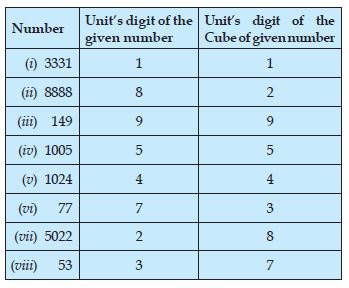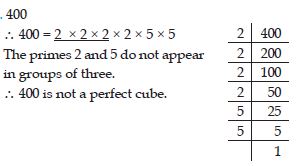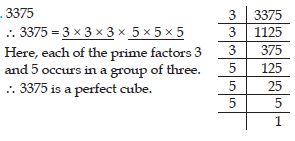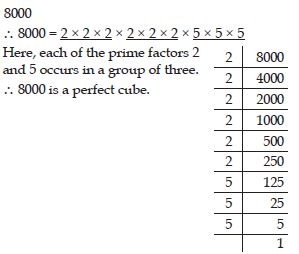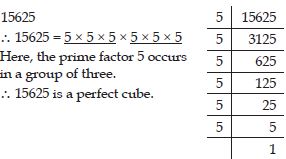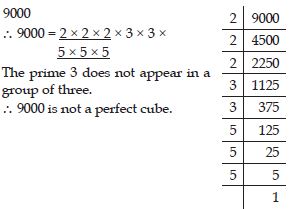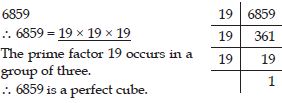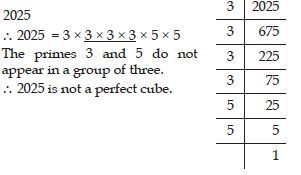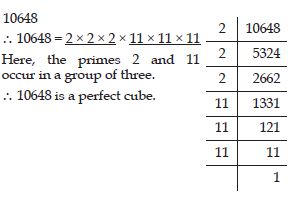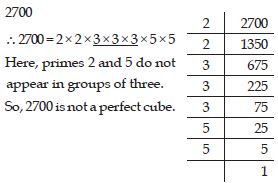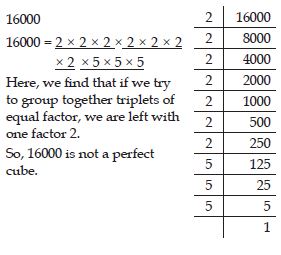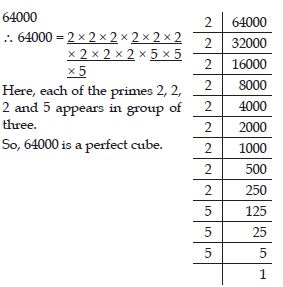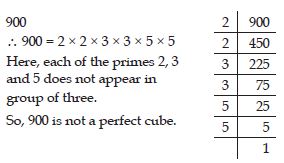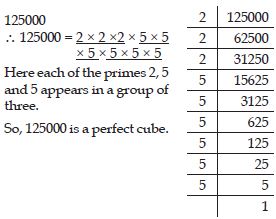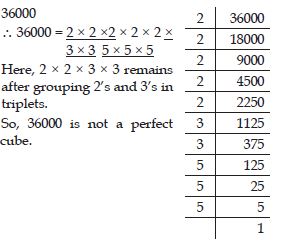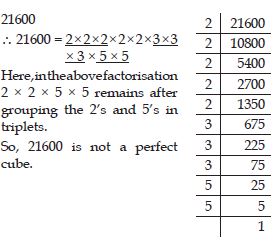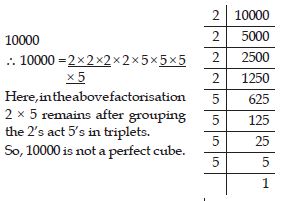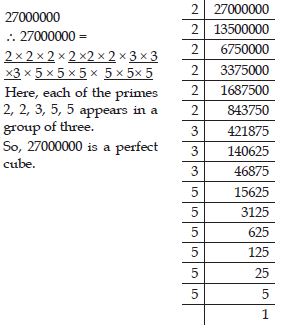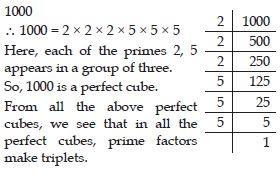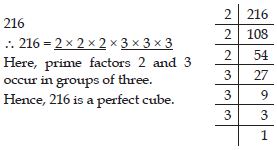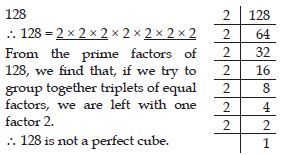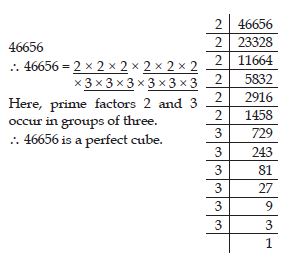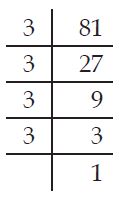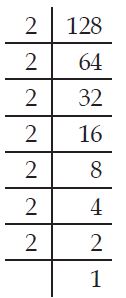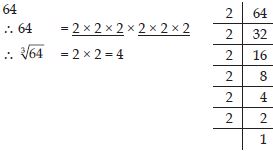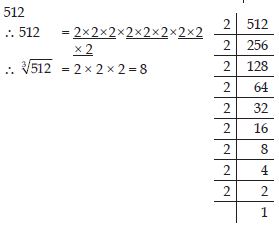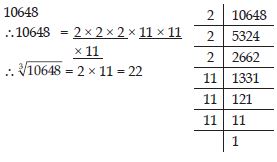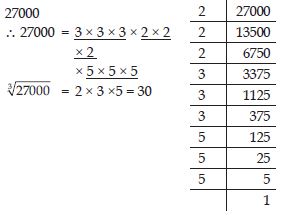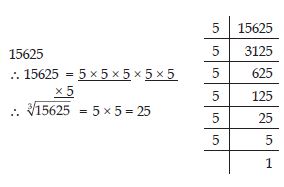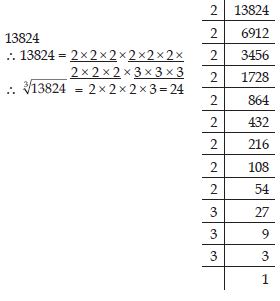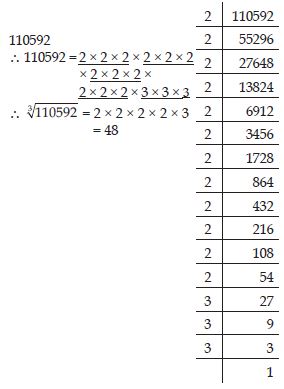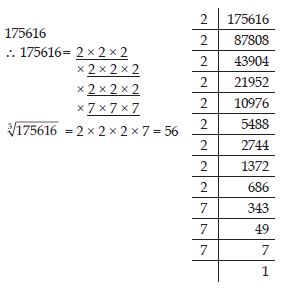Question 1:
Find the one’s digit of the cube of each of the following numbers.
(i) 3331 (ii) 8888 (iii) 149
(iv) 1005 (v) 1024 (vi) 77
(vii) 5022 (viii) 53
Answer:
As we know that, the cube of a number ending in 0, 1, 4, 5, 6 and 9 ends in 0, 1, 4, 5, 6 and 9 respectively. However, the cube of a number ending in 2 ends in 8 and vice-versa. Similarly, the cube of a number ending in 3 or 7 ends in 7 or 3 respectively. Thus, by looking at the unit digit of a given number, we can determine the unit’s digit of its cube. Now, unit’s digit of the cube of each of the asked numbers is as follows:
Question 2:
Express the following number as the sum of odd numbers using the above pattern.
63
Answer:
63 = 216 = 31 + 33 + 35 + 37 + 39 + 41
Question 3:
Express the following number as the sum of odd numbers using the above pattern.
83
Answer:
83 = 512 = 57 + 59 + 61 + 63 + 65 + 67 + 69 + 71
Question 4:
Express the following number as the sum of odd numbers using the above pattern.
73
Answer:
73 = 343 = 43 + 45 + 47 + 49 + 51 + 53 + 55
Question 5:
Consider the following pattern:
23 - 13 = 1 + 2 x 1 x 3
33 - 23 = 1 + 3 x 2 x 3
43 - 33 = 1 + 4 x 3 x 3
Using the above pattern, find the value of the
following:
73 - 63
Answer:
73 – 63
According to the given pattern:
73 – 63 = 1 + 7 x 6 x 3
Question 6:
Consider the following pattern:
23 – 13 = 1 + 2 x 1 x 3
33 – 23 = 1 + 3 x 2 x 3
43 – 33 = 1 + 4 x 3 x 3
Using the above pattern, find the value of the
following:
123 – 113
Answer:
123 – 113
According to the given pattern:
123 – 113 = 1 + 12 x 11 x 3
Question 7:
Consider the following pattern:
23 – 13 = 1 + 2 x 1 x 3
33 – 23 = 1 + 3 x 2 x 3
43 – 33 = 1 + 4 x 3 x 3
Using the above pattern, find the value of the
following:
203 – 193
Answer:
203 – 193
According to the given pattern:
203 – 193 = 1 + 20 x 19 x 3
Question 8:
Consider the following pattern:
23 – 13 = 1 + 2 x 1 x 3
33 – 23 = 1 + 3 x 2 x 3
43 – 33 = 1 + 4 x 3 x 3
Using the above pattern, find the value of the
following:
513 – 503
Answer:
513 – 503
According to the given pattern:
513 – 503 = 1 + 51 x 50 x 3
Question 9:
Check whether 400 is perfect cube or not.
Answer:
Question 10:
Check whether 3375 is perfect cube or not.
Answer:
Question 11:
Check whether 8000 is perfect cube or not.
Answer:
Question 12:
Check whether 15625 is perfect cube or not.
Answer:
Question 13:
Check whether 9000 is perfect cube or not.
Answer:
Question 14:
Check whether 6859 is perfect cube or not.
Answer:
Question 15:
Check whether 2025 is perfect cube or not.
Answer:
Question 16:
Check whether 10648 is perfect cube or not.
Answer:
Question 17:
Check whether 2700 is perfect cube or not.
Answer:
Question 18:
Check whether 16000 is perfect cube or not.
Answer:
Question 19:
Check whether 64000 is perfect cube or not.
Answer:
Question 20:
Check whether 900 is perfect cube or not.
Answer:
Question 21:
Check whether 125000 is perfect cube or not.
Answer:
Question 22:
Check whether 36000 is perfect cube or not.
Answer:
Question 23:
Check whether 21600 is perfect cube or not.
Answer:
Question 24:
Check whether 10000 is perfect cube or not.
Answer:
Question 25:
Check whether 27000000 is perfect cube or not.
Answer:
Question 26:
Check whether 1000 is perfect cube or not.
Answer:
Question 27:
Check whether 216 is perfect cube or not.
Answer:
Question 28:
Check whether 128 is perfect cube or not.
Answer:
Question 29:
Check whether 1000 is perfect cube or not.
Answer:
Question 30:
Check whether 100 is perfect cube or not.
Answer:
Question 31:
Check whether 46656 is perfect cube or not.
Answer:
Question 32:
Find the smallest number by which 243 must be multiplied to obtain a perfect cube.
Answer:
243 = 3 × 3 × 3 × 3 × 3
We note that, prime factor 3 appears in a group of 3. Further, we are left with two more factors 3.
So, if we multiply 3 × 3 by 3 i.e., then in the product 3 will appear in one more group of three and the product will be a perfect cube.
i.e.,
243 × 3 = 3 × 3 × 3 × 3 × 3 × 3 = 729
which is a perfect cube.
Hence, the smallest whole number by which
243 should be multiplied to make a perfect
cube is 3.
Question 33:
Find the smallest number by which 256 must be multiplied to obtain a perfect cube.
Answer:
256
256 = 2 × 2 × 2 × 2 × 2 × 2 × 2 × 2
We note that, prime factor appears in groups of
3. Further, we are left with two more factors 2.
To make it a perfect cube, we need one more 2.
In that case:
256 × 2 = 2 × 2 × 2 × 2 × 2 × 2 × 2 × 2 × 2 = 512
which is a perfect cube.
Hence, the smallest whole number by which
256 should be multiplied to make it a perfect
cube is 2.
Question 34:
Find the smallest number by which 72 must be multiplied to obtain a perfect cube.
Answer:
72
72 = 2 × 2 × 2 × 3 × 3
We note that, prime factor 2 appears in
groups of 3. Further, we are left with two
more factors 3.
To make it a perfect cube, we need one more 3.
In that case:
72 × 3 = 2 × 2 × 2 × 3 × 3 × 3 = 216
which is a perfect cube.
Hence, the smallest whole number by which
72 should be multiplied to make it a perfect
cube is 3.
Question 35:
Find the smallest number by which 675 must be multiplied to obtain a perfect cube.
Answer:
675
675 = 3 × 3 × 3 × 5 × 5
We note that, in prime factorisation of 675,
prime factor 3 appears in a group of 3. Further,
we are left with two more factors 5.
To make it a perfect cube, we need one
more 5.
In that case:
675 × 5 = 3 × 3 × 3 × 5 × 5 × 5 = 3375
which is a perfect cube.
Hence, the smallest whole number by which
675 should be multiplied to make it a perfect
cube is 5.
Question 36:
Find the smallest number by which 100 must be multiplied to obtain a perfect cube.
Answer:
100
100 = 2 × 2 × 5 × 5
We note that, in the prime factorisation
of 100, the prime factors 2 and 5 are not in
groups of 3.
We have, one more 2 and one more 5 to
make them in groups of 3.
In that case:
100 × 2 × 5 = 2 × 2 × 2 × 5 × 5 × 5 = 1000
which is a perfect cube.
Hence, the smallest whole number by which
100 should be multiplied to make it a perfect
cube is 10.
Question 37:
Find the smallest number by which 81 must be divided to obtain a perfect cube.
Answer:
81
81 = 3 × 3 × 3 × 3
The prime factor 3 does not appear in a group of three.
81 is not a perfect cube.
In the prime factorisation of 81, one factor 3 remains ungrouped.
So, 81 is not a perfect cube.
If we divide 81 by 3, then the prime factorisation
of the quotient becomes 81 ÷ 3 = 3 × 3 × 3 = 27 which is a perfect cube.
Hence, the smallest number by which 81 should be divided to make it a perfect cube is 3.
Question 38:
Find the smallest number by which 128 must be divided to obtain a perfect cube.
Answer:
128
128 = 2 × 2 × 2 × 2 × 2 × 2 × 2
In the prime factorisation of 128, one factor 2 remains ungrouped.
So, 128 is not a perfect cube.
If we divide 128 by 2, then the prime factorisation of the quotient becomes
128 ÷ 2 = 2 × 2 × 2 × 2 × 2 × 2 = 64
which is a perfect cube.
Hence, the smallest number by which 128
should be divided to make it perfect cube is 2.
Question 39:
Find the smallest number by which 135 must be divided to obtain a perfect cube.
Answer:
135
135 = 3 × 3 × 3 × 5
In the prime factorisation of 135, the factor 5 remains ungrouped.
So, 135 is not a perfect cube.
If we divide 135 by 5, then the prime factorisation of the quotient
becomes 135 ÷ 5 = 3 × 3 × 3 = 27
which is a perfect cube.
Hence, the smallest number by which 135 should be divided to make it a perfect cube is 5.
Question 40:
Find the smallest number by which 192 must be divided to obtain a perfect cube.192
192 = 2 × 2 × 2 × 2 × 2 × 2 × 3
In the prime factorisation of 192, the factor 3 remains ungrouped.
So, 192 is not a perfect cube.
If we divide 192 by 3, then the prime factorisation of the quotient
becomes
192 ÷ 3 = 2 × 2 × 2 × 2× 2× 2 = 64
which is a perfect cube.
Hence, the smallest number by which 192
should be divided to make it a perfect cube is 3.
Answer:
192
192 = 2 × 2 × 2 × 2 × 2 × 2 × 3
In the prime factorisation of 192, the factor 3 remains ungrouped.
So, 192 is not a perfect cube.
If we divide 192 by 3, then the prime factorisation of the quotient
becomes
192 ÷ 3 = 2 × 2 × 2 × 2× 2× 2 = 64
which is a perfect cube.
Hence, the smallest number by which 192
should be divided to make it a perfect cube is 3.
Question 41:
Find the smallest number by which 704 must be divided to obtain a perfect cube.
Answer:
704
704 = 2 × 2 × 2 × 2 × 2 × 2 × 11
In the prime factorisation of 704, the factor 11 remains ungrouped.
So, 704 is not a perfect cube.
If we divide 704 by 11, then the prime factorisation of the quotient becomes
704 ÷ 11 = 2 × 2 × 2 × 2 × 2 × 2
= 64
which is a perfect cube.
Hence, the smallest number by which 704 should be divided to make it a perfect cube is 11.
Question 42:
Parikshit makes a cuboid of plasticine of sides 5 cm, 2 cm, 5 cm. How many such cuboids will he need to form a cube?
Answer:
The sides of cuboid are 5 cm, 2 cm and 5 cm.
Volume of the plastic in = 2 × 5 × 5 cm3
Here, the prime factors of 2 and 5 are not in
groups of three.
We have to multiply by 2 × 2 × 5 i.e., by 20 to
make it a perfect cube.
Question 43:
Find the cube root of 64 by prime factorisation method.
Answer:
Question 44:
Find the cube root of 512 by prime factorisation method.
Answer:
Question 45:
Find the cube root of 10648 by prime factorisation method.
Answer:
Question 46:
Find the cube root of 27000 by prime factorisation method.
Answer:
Question 47:
Find the cube root of 15625 by prime factorisation method.
Answer:
Question 48:
Find the cube root of 13824 by prime factorisation method.
Answer:
Question 49:
Find the cube root of 110592 by prime factorisation method.
Answer:
Question 50:
Find the cube root of 46656 by prime factorisation method.
Answer:
Question 51:
Find the cube root of 175616 by prime factorisation method.
Answer:
Question 52:
Find the cube root of 91125 by prime factorisation method.
Answer:
Question 53:
Cube of any odd number is even.
- TRUE
- FALSE
Answer:
FALSE
Question 54:
A perfect cube does not end with two zeros.
- TRUE
- FALSE
Answer:
TRUE
Question 55:
If square of a number ends with 5, then its cube ends with 25.
- TRUE
- FALSE
Answer:
TRUE
Question 56:
There is no perfect cube which ends with 8
- TRUE
- FALSE
Answer:
FALSE
Question 57:
The cube of two digit number may be a three digit number.
- TRUE
- FALSE
Answer:
FALSE
Question 58:
The cube of a two digit number may have seven or more digits.
- TRUE
- FALSE
Answer:
FALSE
Question 59:
The cube of a single digit number may be a single digit number.
- TRUE
- FALSE
Answer:
TRUE
Question 60:
You are told that 1331 is a perfect cube. Can you guess without factorisation what is its cube root? Similarly, guess the cube roots of 4913, 12167, 32768.

